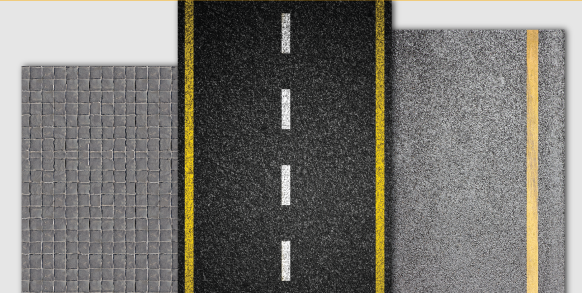Asphalt is one of the most widely used materials in road and pavement construction worldwide. This material, composed of a mixture of bitumen and petroleum-derived compounds, stands out for its durability, adhesion, and waterproofing properties, making it indispensable for both urban and rural infrastructure projects.
In this article, we will explore the main types of asphalt, their characteristics, and applications, along with examples of how they are used in construction projects.

What is Asphalt?
Asphalt is a black-colored substance primarily obtained from the distillation of crude oil. Naturally, it can also be found in deposits such as the Asfaltites Lake or the Dead Sea. Its main use is as a paving material, although it is also applied in waterproofing and coatings.
Today, nearly all asphalt used is artificial, processed from petroleum.
Key Properties of Asphalt
The success of asphalt as a construction material is due to several essential properties:
- Adhesion: It provides a firm grip for vehicle tires, enhancing road safety, especially for motorcycles and light vehicles.
- Waterproofing: It resists water and moisture penetration, protecting paved surfaces from cracks and structural damage.
- Cohesion: Its ability to remain unified makes it easy to repair, extending the lifespan of roads and other asphalted surfaces.
Main Uses of Asphalt
Asphalt is an extremely versatile material. Some of its most common applications include:
- Roads and highways: Covers most land transportation routes due to its durability and resistance.
- Airports: Used for runways, where its quality directly impacts operational safety.
- Waterproofing: Seals walls, roofs, and other surfaces, protecting them from water infiltration.
- Coatings: Applied to roofs and other structures to shield them from wear and extreme weather conditions.
- Canals and dams: Seals joints and improves water resistance in hydraulic structures.
Types of Asphalt and Their Differences

1. Polished Asphalt
- Characteristics: A decorative asphalt that is polished to expose the aggregate, resulting in an anti-slip and visually appealing finish.
- Uses: Ideal for pedestrian areas and decorative surfaces where aesthetics and functionality are desired.
2. Pure Asphalt
- Characteristics: Derived directly from the petroleum refining process. It is solid and mainly used as a waterproofing material.
- Uses: Manufacturing of asphalt emulsions and paving in refineries.
3. Liquid Asphalt
- Characteristics: A more fluid consistency that facilitates application on damaged surfaces. It acts as a waterproofing and anti-corrosive agent.
- Uses: Road repairs and sealing cracks in pavements.
4. Eco-Efficient Asphalt
- Characteristics: Uses low-temperature asphalt mixtures that reduce greenhouse gas emissions. It also recycles materials from existing roads.
- Uses: Sustainable projects aiming to minimize environmental impact.
5. Plastic Asphalt
- Characteristics: A mix of asphalt, minerals, and fibers, offering high elasticity. It is ideal for horizontal surfaces requiring waterproofing.
- Uses: Surface leveling and adhesion on roofs and walls.
6. Asphalt Emulsions
- Characteristics: A combination of asphalt and water, allowing for application at lower temperatures below 100°C. It is suitable for adverse weather conditions.
- Uses: Paving in areas where extreme heat complicates the use of traditional asphalt.
7. Stamped Asphalt
- Characteristics: A decorative asphalt technique where the surface is heated, a mold is applied, and a specific design is imprinted. It offers aesthetic appeal without sacrificing functionality.
- Uses: Urban applications combining functionality with attractive designs, such as public squares and pedestrian paths.
Comparison of Asphalt Types
| Type of Asphalt | Key Characteristics | Primary Uses |
|---|---|---|
| Polished Asphalt | Decorative, anti-slip | Pedestrian paths, urban areas |
| Pure Asphalt | Solid, waterproof | Roads, refineries |
| Liquid Asphalt | Fluid, flexible | Crack repair, waterproofing |
| Eco-Efficient Asphalt | Environmentally friendly, reusable | Sustainable projects, road construction |
| Plastic Asphalt | Elastic, adhesive | Roofs, horizontal surfaces |
| Asphalt Emulsions | Cold application | Adverse weather, quick repairs |
| Stamped Asphalt | Decorative, patterned | Squares, decorative paths |
Asphalt is an essential material in modern construction, with different types designed to fulfill specific functions. From heavily trafficked roads to pedestrian areas and sustainable projects, this material adapts to the needs of each environment.
Choosing the right type of asphalt ensures not only functionality but also durability and sustainability for the project. With technological advancements, asphalt will remain a key ally in constructing and maintaining infrastructures worldwide.






